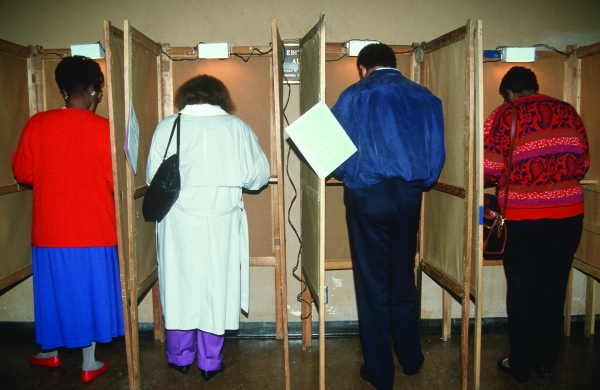
Sri Lanka

Sri Lanka’s presidential elections were held in January – two years ahead of schedule. The incumbent President Mahinda Rajapaksa of the United People’s Freedom Alliance called for the rescheduling in pursuit of a third term in office and, in a generally unforeseen turn of events, was defeated by Maithripala Sirisena, the former Minister of Health in Rajapaksa’s government and general secretary of the Sri Lanka Freedom Party (SLFP), as well as the common candidate of the opposing United National Party-led coalition and the SLFP. Sirisena won 51.3 per cent of the vote and Rajapaksa 47.6 per cent, with a turnout of 81.5 per cent. Sirisena was sworn in on 9 January, with Ranil Wickremesinghe as Prime Minister, and control of the government was peacefully transferred to Sirisena. A special investigation into allegations of an attempted coup by Rajapaksa was carried out, but Rajapaksa’s spokesperson, the army and the police have since denied these. In the parliamentary elections that followed in August, the United National Party won 106 of 225 seats, the United People’s Freedom Alliance 95, the Tamil National Alliance 16 and the Janatha Vimukthi Peramuna six.
Greece
In January’s parliamentary elections, Greece lost patience with its traditional mainstream parties and elected Syriza, a coalition of radical leftists that pledged to roll back austerity, renegotiate the country’s colossal debt and tear up the bail-out agreements that they said had created a humanitarian crisis. The Coalition of the Radical Left took 36.3 per cent of the votes (149 of 300 seats) and Syriza leader Alexis Tsipras was sworn in as Prime Minister. New Democracy got 27.8 per cent (76), far right party Golden Dawn 6.3 per cent (17), The River six per cent (17), the Communist Party 5.5 per cent (15), the Independent Greeks 4.7 per cent (13) and the Panhellenic Socialist Movement 4.7 per cent (13). Turnout was 63.9 per cent. Seven months later, Tsipras announced that he was stepping down, having lost his majority, paving the way for snap elections in September. Vassiliki Thanou was named head of a caretaker government and sworn in as Prime Minister. But the 20 September election saw Syriza returned to power, albeit without an overall majority and with slightly fewer MPs than in January, getting just over 35 per cent of seats (145). Opposition party New Democracy took 28 per cent (76), Golden Dawn seven per cent (18), Democratic Coalition six per cent (17), the Communist Party six per cent (15), The River four per cent (11), Independent Greeks four per cent (ten) and Union of Centrists nine (three). Syriza will again renew its coalition with the Independent Greeks. Turnout was low at 57 per cent.
Zambia

President Michael Sata died on 28 October 2014 and Vice-President Guy Scott took office as Acting President. The consequent presidential election, held on 20 January 2015, was won by the Patriotic Front’s candidate, Edgar Lungu (with 48.8 per cent of votes). President Lungu was sworn in on 25 January to serve the rest of President Sata’s term until the next presidential, parliamentary and local government elections in 2016. Turnout was low at 32.4 per cent.
St Kitts and Nevis
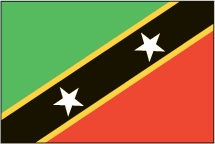
In the February general election, the centre-left Saint Kitts and Nevis Labour Party (SKNLP) was denied a fifth consecutive term of office by Team Unity, an alliance of the Concerned Citizens’ Movement (CCM), the People’s Action Movement (PAM) and the recently established People’s Labour Party (PLP), led by Timothy Harris of the PLP. Team Unity won seven seats (PAM four, CCM two and PLP one), SKNLP three and NRP one. Turnout was around 72 per cent and Harris was sworn in as Prime Minister on 18 February.
Italy

Constitutional Court Judge Sergio Mattarella was elected President in a fourth round of elections following the resignation of incumbent President Giorgio Napolitano, who had set a national record by remaining in office for eight and a half years. In accordance with the Italian Constitution, only members of parliament and regional delegates are entitled to vote. Mattarella, an independent candidate, won 665 votes to Five Star Movement’s Ferdinando Imposimato’s 127, the Socialist Party’s Vittorio Feltri’s 46 and independent Stefano Rodotà’s 17, while 105 votes were left blank and 13 deemed invalid. The four rounds were completed within two days.
Lesotho
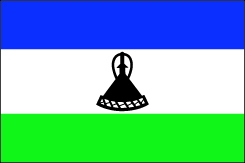
A general election was held in February to elect all 120 seats of the parliament’s lower house, the National Assembly, more than two years ahead of schedule, as a consequence of the Southern African Development Community’s mediation efforts following the 2014 political crisis, which resulted in parliament being dissolved by King Letsie III on the advice of the incumbent Prime Minister Tom Thabane. In the election, Pakalitha Mosisili’s Democratic Congress (DC) won 47 seats, Thabane’s All Basotho Convention (ABC) 46, the Lesotho Congress for Democracy (LCD) 12 and the Basotho National Party seven. Neither DC nor ABC won a majority of the 120 seats in parliament and, after negotiations, on 4 March 2015 the DC announced that it would form a coalition government with the LCD and five other smaller parties. Lesotho’s army was confined to the barracks on the election day. Voter turnout was 48 per cent.
For more on politics in Lesotho, see ‘In Focus Lesotho’ pages 14-21.
Andorra
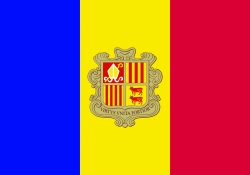
In parliamentary elections, the Democrats for Andorra won 37 per cent of the vote – 15 of 28 seats on the General Council, which acts as Andorra’s parliament. The Liberals of Andorra got 27.7 per cent (eight seats), the alliance of the Social Democratic Party of Andorra, Greens, and Citizens’ Initiative 23.5 per cent (three), and Social Democracy and Progress 11.7 per cent (two). Turnout at the March election was 65.6 per cent. Incumbent Antoni Martí Petit was re-elected Head of Government by parliament, winning 15 votes to Josep Pintat’s seven. Andorra is the sixth smallest nation in Europe, with a population of just 78,000.
–
El Salvador

In this year’s parliamentary election, the right-wing Nationalist Republican Alliance won 40.4 per cent of the vote (35 of 84 seats), the centre-left Farabundo Martí National Liberation Front 37.3 per cent (31), the centre-left Grand Alliance for National Unity 9.3 per cent (11) and the right-wing Party of National Consultation 7.2 per cent (six). Turnout at the March election was 47.8 per cent.
–
Estonia

In Estonia’s March parliamentary elections, the ruling Reform Party won 27.7 per cent of the vote and 30 of 101 seats. The result was a knock to the Centre Party, which has ties to President Vladimir Putin of Russia and had been forecast a better result, but secured a lesser 24.8 per cent (27 seats); the Social Democratic Party won 15.2 per cent (15 seats), the Pro Patria and Res Publica Union 13.7 per cent (14), the Free Party 8.7 per cent (eight) and the Conservative People’s Party 8.1 per cent (seven). Turnout was 64.2 per cent.
–
Israel

In the March parliamentary elections, Likud won 23.4 per cent of the vote (30 of 120 seats), the Zionist Camp 18.7 per cent (24), the Joint List 10.5 per cent (13), Yesh Atid 8.8 per cent (11), Kulanu 7.5 per cent (ten), Bayit Yehudi 6.7 per cent (eight), Shas 5.7 per cent (six), Yisrael Beiteinu 5.1 per cent (six), United Torah Judaism five per cent (six), Meretz 3.9 per cent (five), and Yachad three per cent (none). Turnout was 72.4 per cent. Incumbent Prime Minister Benjamin Netanyahu was tasked with forming the new government, but it took until May for him to build a coalition, having been granted an extension by President Reuven Rivlin when a coalition had not been finalised by the usual four week deadline after the election. Two hours before the deadline, a coalition was announced consisting of the Likud party, Jewish Home, United Torah Judaism, Kulanu and Shas. This gave Netanyahu 61 seats – the minimum needed to form a majority.
–
Portugal

October’s parliamentary elections saw the incumbent Social Democratic Party/Popular Party coalition returned to power with 38.2 per cent of the vote and 99 of 230 seats. This makes Portugal the first of the eurozone countries that received financial aid from the EU to re-elect a government that had imposed harsh austerity measures. Several countries were bailed out by the EU to stave off a severe recession, but had to promise cost savings in return that were always unpopular domestically. The Socialist Party came second with 33.6 per cent (85 seats), the Left Bloc gained 10.6 of votes (19), the United Democratic Coalition 8.6 per cent (17), and the Social Democratic Party (Azores and Madeira) 1.6 per cent (five). Turnout was low at 57 per cent. Pedro Passos Coelho remains Prime Minister.
Finland

Prime Minister Alexander Stubb resigned and President Sauli Niinistö asked Juha Sipilä to form a new government following parliamentary elections in April. The elections saw the Centre Party win 21.1 per cent of the vote (49 of 200 seats), the National Coalition Party 18.2 per cent (37), the Finns Party 17.6 per cent (38), the Social Democratic Party 16.5 per cent (34), the Green League 8.5 per cent (15), the Left Alliance 7.1 per cent (12), the Swedish People’s Party 4.9 per cent (nine) and the Christian Democrats 3.5 per cent (five). Turnout was 66.8 per cent.
United Kingdom

In the May general election the Conservative Party won a narrow majority, defying the polls, which had pointed to a result that was too close to call; it had been widely expected that there would be a hung parliament. In a 66 per cent turnout, the Conservatives won 331 seats, the Labour Party 232, the Scottish National Party (SNP) 56 and the Liberal Democrats eight. The Conservatives’ victory brought to an end five years of coalition government, which had seen the Conservatives team up with the Liberal Democrats. The 2015 election saw the Liberal Democrats lose 49 seats, a loss that was widely attributed to dissatisfaction with the coalition on the part of former Liberal Democrat supporters. Labour saw considerable losses in Scotland – a traditional Labour heartland – with it retaining only one Scottish seat. The Scottish National Party took every Scottish seat, bar three, the other two going to the Conservatives and the Liberal Democrats. Both the Liberal Democrat and Labour Party leaders resigned as a result of the election’s outcome. David Cameron remains as Prime Minister.
–
Denmark

In parliamentary elections, the Social Democrats won 26.3 per cent of the vote (47 of 175 mainland seats), the Danish People’s Party 21.1 per cent (37), Venstre (Liberals) 19.5 per cent (34), the Red–Green Alliance 7.8 per cent (14), the Liberal Alliance 7.5 per cent (13), the Alternative 4.8 per cent (nine), Radikale Venstre (Social Liberals) 4.6 per cent (eight), the Socialist People’s Party 4.2 per cent (seven) and the Conservative People’s Party 3.4 per cent (six). Turnout was 85.8 per cent. Prime Minister Helle Thorning-Schmidt resigned and Lars Løkke Rasmussen (Venstre) formed a minority government on a mandate from the Queen.
–
Burundi

In June’s parliamentary elections, Burundi’s ruling National Council for the Defense of Democracy-Forces for the Defense of Democracy (CNDD-FDD) won 74.8 per cent of the vote (77 of 100 seats), the Independents (Abigenga) 13.9 per cent (21) and the Union for National Progress (UPRONA) 3.1 per cent (two). Turnout was 74.3 per cent. Incumbent President Pierre Nkurunziza ran for a third term in July, despite controversy over whether he was eligible to run again. While the opposition boycotted the vote, Nkurunziza won re-election with 69.4 per cent of the votes.
–
Myanmar

In the country’s first openly contested general election since 1990, Aung San Suu Kyi’s party, the National League for Democracy, won a resounding victory at the November polls, with 255 out of 440 seats in the House of Representatives (58 per cent) and 135 out of 224 seats (60 per cent) in the House of Nationalities. The Union Solidarity and Development Party won 29 seats in the House of Representatives (6.6 per cent) and 112 (5.3 per cent) in the House of Nationalities. Long-time freedom fighter Aung San Suu Kyi is prevented by the constitution from becoming President, as her sons have British nationality. But she has hinted that a new role above that of President may be created.
–
Guatemala

In September’s presidential elections, leader of the National Convergence Front and comic actor Jimmy Morales won 23.8 per cent of votes, while opponents Sandra Torres of National Unity of Hope and Manuel Baldizón of Renewed Democratic Liberty took 19.8 per cent and 19.6 per cent, respectively. Since no candidate received more than 50 per cent of the votes, a run-off took place in October, which Morales won comfortably with 68 per cent of the vote. The elections were held concurrently with those to elect all 158 Congress deputies, all 20 deputies of the Central American Parliament, and mayors and councils for all 338 municipalities in the country. In the run up to the elections there had been calls for Guatemalans to wear mourning clothes as they went to cast their votes as a show of scepticism that the poll would achieve any real political change.
–
Singapore

The September general election saw the People’s Action Party (PAP) decisively increase its share of the votes cast, winning 83 of 89 seats with 69.9 per cent of the votes. The Workers’ Party took six seats and 12.5 per cent of the votes. Turnout was 94 per cent. Analysts suggested that PAP’s gain of three additional seats could have been influenced by the recent death of the country’s first Prime Minister, and father of the current PM, Lee Kuan Yew. PAP has won every election since Singapore’s independence in 1965. The 2011 election had seen PAP lose seats, which was attributed, at the time, to public unease about immigration, a housing shortage and problems with public transport. These problems had been largely resolved by the 2015 elections.
–
Canada

The October general election saw the Liberals sweep to power, winning 54 per cent of seats and seeing off the incumbent Conservatives. The victory took many by surprise, as the Liberals had come third in the 2011 elections and new Prime Minister Justin Trudeau – son of popular former Prime Minister Pierre – had been polling third in the run up to the elections. Trudeau, a young head of government at just 43, has promised action on climate change and a renewed relationship with indigenous people “on a nation by nation basis”. He has been the Liberal leader since 2013, following the resignation of Michael Ignatieff after the disappointing election result two years earlier. The Liberals won 39.5 per cent of the vote (184 of 338 seats), the Conservative Party 32 per cent (99 seats), the New Democratic Party 19.7 per cent (44), Bloc Québécois 4.7 per cent (ten), the Green Party 3.5 per cent (one). Turnout was 69 per cent.
–
Turkey

A November parliamentary election saw Turkey’s ruling Justice and Development Party (AKP) remain in power, with just under 50 per cent of votes. The election followed an inconclusive ballot in June, which saw AKP win, but fail to get a decisive majority. This time around, AKP got 317 of 550 seats. Minority groups fear that the Islamic-leaning AKP will do little to unite warring factions, with recent unrest bringing renewed fighting in Kurdish areas. The Republican People’s Party won 25.3 of the vote (134 seats), the Nationalist Movement Party 11.9 per cent (40), and the People’s Democratic Party 10.8 per cent (59). Recep Tayyip Erdoğan remains as President. Turnout was 85.2 per cent.
–
Tanzania
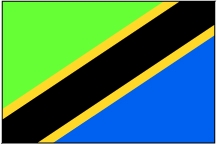
October’s presidential elections saw John Magufuli of the Party of the Revolution (CCM) win with 58 per cent of the vote, beating former Prime Minister Edward Lowassa of Chadema, who polled 40 per cent. The result extends the run of CCM, with Magufuli, a government minister with a doctorate in chemistry, pitching himself as an anti-corruption stalwart. Lowessa, however, disputed the result, accusing the National Electoral Commission of announcing partial results and asking for Magufuli’s victory to be nullified.
–
Poland

In October’s parliamentary elections, Law and Justice won 37.6 per cent of the vote (235 of 460 seats), the Civic Platform 24.1 per cent (138), Kukiz’15 8.8 per cent (42), Modern 7.6 per cent (28), and the Polish People’s Party 5.1 per cent (16). This was the first European election since Norway’s 1993 ballot in which the two largest parties both fielded a female candidate as leader. Beata Szydło is the new Prime Minister.
–
Trinidad and Tobago

The September general election was won by the People’s National Movement and its leader, Keith Rowley, was sworn in as Prime Minister on 9 September. The PNM took 23 seats in the House of Representatives (securing 51.7 per cent of the votes cast) and the UNC the remaining 18 seats (39.6 per cent). Turnout was 67 per cent. The Commonwealth observer group present at the election concluded that ‘the poll was inclusive, peaceful and well conducted’.
–
Free and fair elections in Nigeria
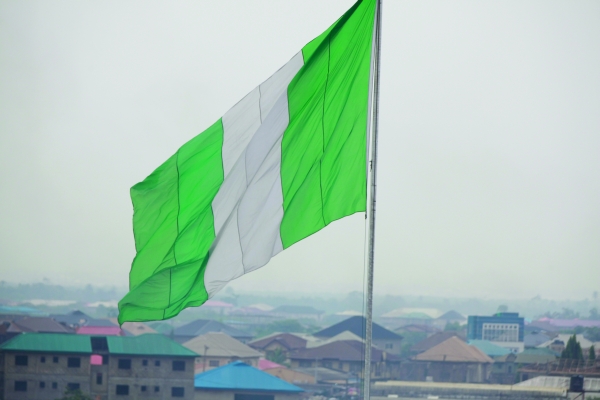
In January 2015 Nigeria’s incumbent President, Goodluck Jonathan of the People’s Democratic Party, and his main opponent, General Muhammadu Buhari of the All Progressives Congress, signed an inter-party agreement to aid in the peaceful running of the upcoming presidential elections. The agreement committed both parties to taking active measures to prevent electoral violence before, during and after the elections.
In the run up to the elections, observers waited with bated breath to witness events unfold in the most competitive election since Nigeria’s return to civilian rule in 1999. Since the end of military rule, Nigeria had been governed consistently by Goodluck Jonathan’s Peoples Democratic Party. This year, the incumbent president stood for re-election, seeking his second and final term as President of Nigeria.
As night fell at the end of the final day of the elections, the results began to speak for themselves. Opposition candidate Buhari took the presidency by more than 2.5 million votes, winning 54 per cent of the total vote. Buhari succeeded in securing more than 25 per cent of votes in 24 states across Nigeria, ruling out the need for a run-off vote.
President Muhammadu Buhari was sworn into office on 29 May 2015.
Incumbent President Jonathan received just 45 per cent of the vote and, some three months after signing the inter-party agreement, humbly conceded to the success of the All Progressives Congress. In a statement given on 31 March, Jonathan thanked the Nigerian people for giving him the opportunity to serve as leader of Nigeria and congratulated Buhari on his success.
“I promised the country free and fair elections. I have kept my word,” Jonathan said, adding that ambition could never be held as more important than the blood of the Nigerian people. “The unity, stability and progress of our dear country is more important than anything else,” he said.
Following Buhari’s victory, Lai Mohammed, a spokesperson for the All Progressives Congress party, praised Jonathan for his actions. “There had always been this fear that he might not want to concede, but he will remain a hero for this move. The tension will go down dramatically,” he said.
In the run up to the elections, no one could have anticipated such a smooth transition of powers. There had been widespread fears of electoral violence and vote rigging – in February, the electoral commission was forced to postpone the elections while international forces attempted to regain control of Boko Haram-led areas in the north-east of Nigeria.
Despite this, the elections were found by the commission to be largely peaceful and credible, and resulted in the first ever democratic transition of power between two parties in Nigeria.






